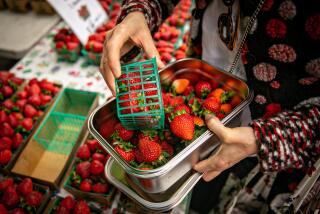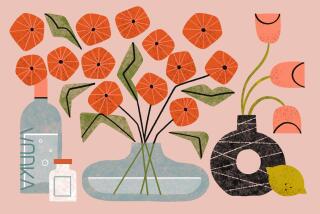EARTHWATCH : Yellow Fever : Lemons can be used for cleaning by people who are soured by toxic household chemicals.
Until recently, I was not amused when the neighbor knocked at the door with a bag of lemons from her tree. I’d thank her politely and, well, put them somewhere.
I had gotten in the habit of accepting them because my wife turned them into lemon juice--which she froze in cubes in an ice tray--for lemonade instead of soda pop. We also squeezed them onto foods instead of using salt. But there were always some left over by the time the neighbor reappeared, lemon-laden again.
Then came the focus on the environment, as well as several things that make lemons look different to me. First, my daughter, to my amazement and delight one evening, cut a lemon in two and with a half in each hand removed the stains from the kitchen sink. She’d seen this done at school in a demonstration about household hazardous waste.
When she was finished, she put the used halves down the garbage disposal, deodorizing the whole kitchen.
You know how it is when you learn the definition of a word you never noticed before, and afterwards it turns up everywhere? So it was with me and lemons. While having lunch with a visitor from the south of France (they visit the south of California), I mentioned my daughter’s feat of legerdemain. My guest shrugged and said his wife cleans copper pots, brass and many other surfaces that way, adding a little bicarbonate, vinegar or salt.
Back at home, I decided to experiment, partly to atone for not having called him to task for male chauvinism, and partly to see if it’s possible to go cold turkey when it comes to household cleaners (thus keeping some toxics out of the water.)
Honest, folks, this yuppie household’s copper pots now look as if someone loves them. Half a lemon and a plastic pot scrubber later, that part of the kitchen looked like it was ready for the Food Section photographer. It had also lost its former industrial-strength-something odor. No powder buildup on the pots, and nothing naughty was rinsed off down the drain.
The advertising slogan “lemon fresh” now jumps out at me from everywhere. But now I know that what makes it fresh is the lemon, not the product itself. Even environmentally safe products list citric acid (lemon juice) among their contents and go on to list acetic acid (vinegar) and things like palm oil (instead of petrochemicals when you’re buying liquid cleansers) or bicarbonate of soda (when you’re getting powdered cleaning supplies.) Well, as they sing out in “A Chorus Line,” “Hey, I can do that.”
Rather than re-invent the wheel I went out and got one. Literally.
A dandy device that looks like a round, oversized novelty greeting card, it’s called (alas) the “Waste Wheel” and displays “recipes” for alternatives to household products that might put toxics into the water, atmosphere and land. In Sacramento, they’ve compiled another useful guide, “Making the Switch,” which shows alternatives to using toxic chemicals in the home.
In other columns, I’ve suggested various environmentally friendly products that, while “correct,” were a little more expensive than the normal item. The lemon and other natural cleaners are cheaper. Yes, there’s the sweat equity involved, because they aren’t as easy or fast cleaning. But there’s a hidden price embedded in regular cleaners that makes it worth making the switch to naturals. We’re paying a lot to clean up our water, air and landfills after using products that contain toxics.
So, nowadays when my neighbor comes by with her surplus lemons, I greet her more enthusiastically. And I hope she’ll be understanding when she discovers in reading this column that, in my fervor as a convert, I’ve planted a lemon sapling in my back yard.
* THE DETAILS: For more information on the “Waste Wheel,” call Waste Management of North America, Oxnard (805) 988-8977. For a copy of “Making the Switch,” contact the Local Government Commission, Sacramento, (916) 448-1198. For further advice on toxics in the home, call the Community Environmental Council, Ventura (805) 963-0583, ext. 104 or 105
More to Read
Eat your way across L.A.
Get our weekly Tasting Notes newsletter for reviews, news and more.
You may occasionally receive promotional content from the Los Angeles Times.










